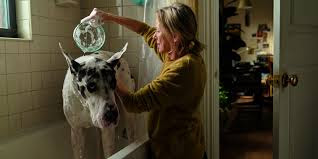or
"What's Going To Happen To The Dog?"
As soon as it's over, you want to watch The Friend again. It's that good, with a literate script, masterful performances (from everybody, not just Naomi Watts and Bill Murray...or the dog, Bing), New York as a background, an intricately selected soundtrack, and the least anthropomorphic animal performance I've seen in a long time.
And, it's a "dog" movie.
I hate "dog" movies, usually. You know why. The dog always seems to die at the end, usually in the dramatic interest of teaching the film's protagonist a life-lesson of great import. Like "life is a gift" or "appreciate what you've got when you've got it." Blah-de-blah-de-blah. I'm cynical of the form because I hate to cry in theaters and beating me with a dead dog turns me into a blubbering wreck and I hate to throw away all the soggy popcorn. The one time I didn't was when John Wick's dog was murdered and that it inspired him to come out of assassination retirement (which I giggled at, finding it perversely ludicrous).
But, this one I rushed to see because, well, Naomi Watts and Bill Murray are in it and their taste in parts alone should sell it, some laudatory words online were mentioned, and it's based on a Booker prize-winning novel by Sigrid Nunez. All indications were for some good breeding of a project that was low-key and mildly amusing. I wasn't prepared for a great movie, but I got it in spades.It starts with a moment of inspiration, which we're not privy to: successful author-teacher Walter Mitchell (Murray) is out on his morning "Two Bridges" jog when he sees something that delights him, but we cut away before we see what has animated him so. We see him at a dinner party where he is holding court, volubly telling the story of his discovery. By the next scene, he is dead—by his own hand, they say*—and the survivors are left wondering how such a thing could happen. What would the world be without Walter? There were so many projects in the air, so many things left undone, and he'd just met his grown daughter whom he—or any of his wives, past or present—never knew existed.
But, hardest hit seems to be Iris (Watts), ostensibly his best friend. Walter was her mentor (currently she's working on a book of his correspondence) and she, in turn, is mentoring his new/old daughter, collaborating on the book. Progress on it has been slow but, now, work on it—like Walter—has come to a screeching halt.
Walter's widow (Noma Dumezweni) has asked Iris to come see her and she has a request. Well, more of a bequest—Walter had asked that if anything happened to him that Iris should take care of his dog, Apollo, the creature that he encountered on that morning run."Apollo" is a 150 lb. Great Dane and Iris weighs quite a bit less and is only half-again taller. Plus, Iris' apartment is, what they call in New York, a "studio" but it could be a "prewar", but anywhere else it would be called "cramped" and if you were selling it you'd mention "simplicity" and "ease of maintenance". In no way would it be considered a kennel, and—besides—it's in a "No Pets Allowed" building. Iris is not keen on the idea and her "go-to" is to avoid the Super as long as she can and find a place to "re-home" Apollo. But, in the meantime, she picks up the dog at its temporary kennel to take to what she hopes is its temporary home in her apartment only to find that the brute jumps on her bed and spreads out, despite her protests. His forlorn look prompts Iris' neighbor to remark "There's a PONY on your bed! A SAD pony!"A sad pony to be sure, but also the elephant in the room. Apollo is just too big to fit into her apartment without obstructing Iris' every movement. She capitulated by pulling an air mattress out of her closet and sleeping on the floor, Apollo's sad eyes never leaving her through the night. But, the two are bonded, despite the separate bed-places in that they're both grieving—she for her mentor, he for his master. One's a human, one's a dog; she's a loner, he's a pack animal, so they're both approaching each other from separate corners. And with all the inconvenience this big white ghost causes in her life, some accommodation needs to be reached, some compromise between these two living beings who've been left behind.
And, ultimately, value.The Friend, unlike so many "dog movies", is what the AARP magazine likes to call "Movies for Grownups". The emotions are complicated and recognizable, and maybe over some folks' heads. But, a New Yorker will recognize the panic of possibly losing a rent-controlled apartment; an older person will recognize the paralysis of grief; a real dog-owner will understand the inconvenience of pet-ownership** ...beyond the dog-movie-cliché antics of four-legged tornado-damage to the feng shui. There are no easy-laugh slobber jokes. This one is about loss, responsibility, and mutual need. And a bit about survivor's guilt. And the usual "taking care of others is more fulfilling than taking care of yourself." And Watts and Murray are brilliant in this.
It's so good and funny and wise that you immediately want to see it again. Or, better yet, read the book to get all the good stuff they couldn't make room for. Sometimes, that's the best part.
* I suppose with the mention of it, I should give the number of the Suicide and Crisis Hotline—If you or a loved one are having emotional distress or thoughts of suicide, call 988 to connect with a lifeline specialist for support.—but DOGE only knows if it still exists. From what I've been able to access online, it does.
** The other day something popped up in my news-feed that still makes me laugh: "Nobody has ever said 'What this house needs is a box-full of shit. Let's get a cat!'"

































































